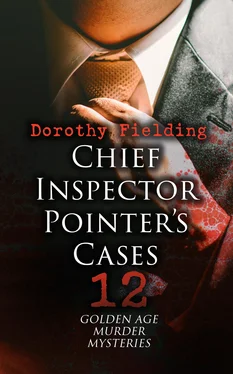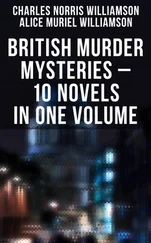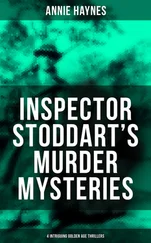Pointer next asked whether Thornton could give him Lady Maxwell's home address. She had left Stillwater the first thing in the morning, so he had learnt from his couple of minutes' gossip with Wilkins the chauffeur.
Thornton told him that she practically lived at Batt's Hotel in London, and Pointer, thanking him, slouched off.
Once more he searched the lane, but he found nothing that could explain the shot heard last night. He had no time, however, to waste in hunting for what possibly did not concern the case at all, when the things that did concern it were so numerous and so baffling.
His first aim was, if possible, to stop valuable records from being lost. Nothing had been burnt in the iron stove of the summer house. Stillwater House had central heating, and gas stoves. Yet Pointer felt sure that the body of Rose Charteris must have been covered when it was trundled along in the dark. She was a tall girl. He looked to find something of about six feet in length A blanket, or a curtain possibly. Then, too, whoever had wiped those flags, might well have left some marks on their clothes. He had looked over the empty bedrooms of the lady housekeeper and the master of Stillwater. He had found nothing suspicious in either. Mrs. Lane's gray lace frock was immaculate. He decided to try once more, and see whether Sibella were still in her bedroom.
As he passed up a back stair leading from the library he heard some one moving about in Rose's sitting-room. Cautiously, noiselessly, he set the door ajar.
It moved without a sound of latch or hinges, as he had already noted.
Pacing up and down was a girl with straight black hair drawn smoothly back from a pale, narrow face. He guessed her rightly to be Sibella Scarlett. Finally with a little resolute squaring of her shoulders, she walked towards the door that led into Rose's bedroom.
That bedroom, where, in the darkness, a girl's body lay waiting to be consigned to deeper darkness yet—never to see the light again. Had the living cousin part or knowledge of the dead cousin's fate? Was it through any act of hers that—terrible thought—the flowers heaped around the bed were fading merely because of what lay in their midst, were withered by one touch of that skin, so cold, so white, still so fair?
Sibella walked decisively enough towards the door, after that curious little shake of herself, but with her fingers on the knob she stopped abruptly. Had Pointer been a believer in apparitions, he would have thought that she stopped by something which she could see only too well invisible though it might be to him. For a second she struggled hard to throw off whatever banned her. She did not succeed. Turning, she almost ran to an arm chair and sank into it. She was out of Pointer's range of vision but after a few minutes he saw her again. Walking with a lagging step, a picture of something more than grief or depression, with compressed lips she passed on out and down the main stairs.
A minute later and Pointer came up from the staircase where he had retired and glanced over her bedroom. A black evening frock hung in her wardrobe. He ran it through his fingers. It was unstained. Then he bent over her shoes. From the buckle of a pair of black satin slippers he shook out quite a teaspoonful of soft garden mould. Dry mould. Not the dark fertiliser of the summer house. This was plain earth, but of a light kind. There were no stains on the soles and no particles of sand. He replaced them, and drove in his battered car to Medchester station, where, as he expected, he found the most deserted telephone booth in the town. Over the wire he explained himself to Paul, and said that he had had an accident with a tablecloth of Mr. Thornton's. What was the name of the cleaners employed by Stillwater House? Paul gave him an address in the High Street. Pointer telephoned there at once. No. No parcel had been left from Stillwater this morning.
Next he got the number of New Scotland Yard, and was soon speaking to Detective-Inspector Watts. He directed that officer, in code, to have a look at any evening frocks of a Lady Maxwell, who was staying presumably at Batt's Hotel. He was particularly to notice a navy dress. Should any of them not be in perfect condition, Watts was to bring the garment in question down himself on a motor bicycle.
Pointer gave him the number of Red Gates, and went there to await the report.
He hunted up Thornton again on his return, and found that gifted author drawing Persian scrolls and leaves on his blotter, a pile of untouched paper beside him.
This time it was Medchester's evening entertainment that seemed to interest the detective.
So Miss Scarlett had driven Mrs. Lane off to the concert in the little two-seater that really belonged to Miss Charteris, but which either of the girls, or, at a pinch, Mrs. Lane, used.
"They can all drive, then?"
"Most women can nowadays," Thornton said easily.
"Yes, but how?" Pointer replied. "I don't suppose the colonel ever lets them take out that big car of his?"
There was no reply.
Pointer drifted out of the room again. He felt that Thornton was not a man in front of whom to drop a card and expect him to be unaware of its suit.
Half an hour later the telephone bell rang. Mr. Brown was wanted by a friend. The friend went on to say that he had found one of the books rather dog-eared, and was bringing it down for him to look at. He might, or might not, want it.
Pointer rang off and made his way to the handsome old inn in Medchester Main Street. Smoking in front of the entrance, he was hailed by a motor cyclist, who waved a kit-bag at him and followed his slow steps up to a bedroom that Brown had just engaged.
There Watts spread out a dark blue silk dress with velvet embossed flowers in high relief. It was one of those modern affairs that can be drawn through a napkin ring and looked rather as though some one had tried that experiment on it quite recently.
"Hotel sneak-thieves must get their living easy," Watts said, standing back. "Lady Maxwell was out, so was her maid. I found this in a package done up as though for the cleaners. I put something else in instead. What do you think of it, sir?"
Pointer was running the soft material through his fingers. He could find no stains, but he felt several stiff places. Turning up the electric light, they showed as purple splotches.
He dropped a little guaiacum solution, and then a few drops of peroxide on one place. Up rose at once a bead of a beautiful bright blue.
"The stiff places are blood right enough." Watts folded up the dress again.
"Humph!" Pointer said, and decided to keep the frock for the moment.
It was late in the afternoon when he drove up to a house in Bayswater, where he shared rooms with a bookbinder friend. O'Connor was his one real confidant, for the Irishman had done some first-class work as a secret service agent during the war, and Pointer could rely on his discretion. Just now he wanted to rely on more than that.
O'Connor had a collection of pencils and inks unrivalled even by Scotland Yard. The pencil that Pointer had found in Thornton's car puzzled him. It made only a thick, oily smear when tried on paper, yet it had evidently been used about one-third down.
O'Connor tried it on his thumb.
"It marks all right like that," Pointer said, "but it's a kind I've never met before."
"I have." O'Connor went to a Wellington cabinet. He turned the Chubb lock, and after a minute laid before his friend another pencil.
"Try that, and see if it isn't the same kind."
It behaved in exactly the same way. The name, Cos tallied.
"What sort of thing is it?" Pointer asked curiously.
"Writes on skin. French surgeons use them a good deal, I believe, to explain to their students just what they're going to do before they cut up a patient. I had a case during the war of a boy with a message written or his back with one of these. That's how I recognised it. And what's the meaning of your blowing in with this implement when you're on your leave?"
Читать дальше












